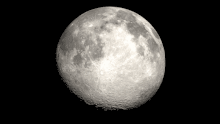Melba Roy Mouton
Melba Roy Mouton (April 28, 1929 – June 25, 1990) was an American mathematician who served as Assistant Chief of Research Programs at NASA's Trajectory and Geodynamics Division in the 1960s[1] and headed a group of NASA mathematicians called "computers".[2] She served as Head Mathematician for Echo Satellites 1 and 2 before becoming Head Computer Programmer and then Program Production Section Chief at Goddard Space Flight Center.
Melba Roy Mouton | |
|---|---|
.jpg.webp) Melba Roy in 1960 | |
| Born | April 28, 1929 |
| Died | June 25, 1990 (aged 61) |
| Alma mater | Howard University |
| Awards | Apollo Achievement Award, NASA Exceptional Performance Award |
| Scientific career | |
| Institutions | United States Census Bureau, Army Map Service, Goddard Space Flight Center |
Early life and education
Melba Louise Chloe was born in 1929,[3] in Fairfax, Virginia to Rhodie and Edna Chloe (née Robinson).[4][5] She graduated from Howard University in 1950 with a master's degree in mathematics,[6] after receiving a bachelor's degree in mathematics with a minor in physics.[7] While at Howard, Mouton was president of the Kelly Miller Chapter of Future Teachers of America and a member of the NAACP, the Mathematics Club, and the Delta Sigma Theta sorority. She also was on the Dean's Honor Roll for four years, and was selected for the 1949-1950 Who’s Who among Students in American Universities and Colleges.[7]
Career

She started working for NASA in 1959, after working for the Army Map Service and the Census Bureau.[6] The following year, Echo 1 was put into orbit, and Mouton led a team of NASA mathematicians (known as "computers") in tracking its orbit.[2] While at Godddard, Mouton was an instructor for a series of seminars on A Programming Language held at Watson Research Labs.[8] In a NASA symposium, she published a paper about the importance of investing in thorough, descriptive program documentation for projects which are to be maintainable over time.[9] She was also prominently featured alongside some of her African American colleagues in an advertisement in the Afro American designed to spotlight NASA's diversity.[10] Mouton received both an Apollo Achievement Award and an Exceptional Performance Award from NASA before she retired in 1973.[11]
Personal life
Mouton had three children and was married twice, first to Wardell Roy and later to Webster Mouton. She died in Silver Spring, Maryland, on June 25, 1990, of a brain tumor at the age of 61.[11][12]
Commemoration
In 2023, lunar mountain Mons Mouton (previously known informally as Leibnitz Beta of the Leibnitz plateau) at the lunar south polar region was named officially in her honor.[13] It is scheduled to become the landing site of the Volatiles Investigating Polar Exploration Rover (VIPER).[14]

References
- "The Goddard General Orbit Determination System" (PDF). NASA. Retrieved 2013-10-21.
- "Human Computer". NASA. Archived from the original on 2013-10-30. Retrieved 2013-10-22.
- "Melba Roy Mouton" (PDF). Chandra X-Ray Observatory. NASA. Retrieved 16 April 2017.
- "Melba Louise (Chloe) Mouton Roy 1929–1990".
- "1940 United States Federal Census for Melva Chloe, Virginia, Prince William, Manassas". www.ancestry.co.uk. Retrieved 2023-06-25.
- "Who We Are – Black Women in Computing". Retrieved 2020-06-10.
- Nelsen, R. Arvid (January 2017). "Race and Computing: The Problem of Sources, the Potential of Prosopography, and the Lesson of Ebony Magazine". IEEE Annals of the History of Computing. 39 (1): 29–51. doi:10.1109/mahc.2016.11. ISSN 1058-6180. S2CID 6992544.
- "EXPERIMENTAL USE OF A PROGRAMMING LANGUAGE (APL) AT THE GODDARD SPACE FLIGHT CENTER" (PDF). November 1968. Retrieved 2016-11-01 – via NASA.
- "Automated Methods of Computer Program Documentation" (PDF). NASA. November 1970. Retrieved 2016-11-01.
{{cite journal}}: Cite journal requires|journal=(help) - "NASA Yes! We are Involved: A Diversified Team can get the Job Done". Afro American. 1972-04-15. Retrieved 2016-11-01.
- "Melba Roy Mouton". The Washington Post. June 29, 1990.
- "Reference to obituary".
- SVS, NASA's (2023-05-30). "SVS: Mons Mouton, a Newly Named Lunar Mountain". SVS. Retrieved 2023-09-24.
- Wright, Ernie; Ladd, David; Colaprete, Anthony; Ladd, David (2021-09-20). "NASA Scientific Visualization Studio". SVS. Retrieved 2023-10-27.